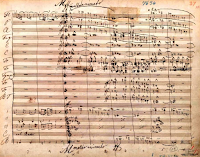Wagner, Schönberg and Bruckner at the Théâtre des Champs Elysées
Théatre des Champs Elysées, Paris, Friday October 5 2018
Conductor: Esa-Pekka Salonen. Philharmonia Orchestra.
As I stood up to leave for dinner after enthusiastic applause I remarked to my neighbour, of Bruckner's 7th as conducted by Esa-Pekka Salonen, "That was super-interesting." At the same moment, I overheard a lady on the row above saying exactly the same thing: "Super-intéressant." While neither of us may have great minds, apparently we were thinking alike. I don't know Salonen especially well, but based on this performance I'd imagine he must be regarded as a distinctive conductor, one whose performances could be picked out by listeners in a blind test.
The Bruckner was thrilling and somehow "modern". There was no attempt to draw it out, however nobly, into what you might call "three funerals and a wedding," i.e. three very slow movements enlivened by a scherzo, as some performances do, leading some people to find poor old Bruckner too long and boring. I attended one Bruckner 7th, now nearly 30 years ago, that lasted an hour and forty minutes. I'll leave you to guess who conducted. It was magnificent, but very different: here, while never feeling hurried, the tempi were brisk overall and we were done and dusted in an hour, so I could still get to the Turks' before the kitchen closed.
There's a certain restraint about Salonen's conducting: it's vigorous and forthright, never wild or aiming at paroxystic climaxes, though of course he makes controlled but full use of the orchestra's potential for building up from a barely audible tremolo to massive tutti as Bruckner so often and so effectively requires, and that degree of control also meant absolute perfection in the abrupt silences scattered through the score.
The textures are clear, bringing out fascinating details (the Philharmonia's principal horn deserves a knighthood for sheer virtuosity in tossing some of these off). They were one of the things that made the performance so interesting, but the main one was Salonen's frequent changes of speed to suit changes of mood in the score. These were surprising at first, and surprisingly never annoying: they were perfectly judged and never once felt mannered or made the score sound disjointed. Quite an achievement.
Before the interval, Salonen had given us a magnificent, virtuoso Verklärte Nacht, combining high drama with great delicacy and giving us a useful reminder of what a great composer Schönberg was. The juxtaposition of the Schönberg and the Tristan excerpts was indeed very instructive. I'd never before heard so much of the latter in the former, never having deliberately listened for it. The Wagner, very tenderly played, oddly seemed almost conventional, plain vanilla, in retrospect.
I missed the soprano. Just as a reminder, here's the Liebestod with one of the best, even if...
Conductor: Esa-Pekka Salonen. Philharmonia Orchestra.
- Wagner: Tristan und Isolde, Prelude and Liebestod
- Schönberg: Verklärte Nacht
- Bruckner: Symphony N°7
As I stood up to leave for dinner after enthusiastic applause I remarked to my neighbour, of Bruckner's 7th as conducted by Esa-Pekka Salonen, "That was super-interesting." At the same moment, I overheard a lady on the row above saying exactly the same thing: "Super-intéressant." While neither of us may have great minds, apparently we were thinking alike. I don't know Salonen especially well, but based on this performance I'd imagine he must be regarded as a distinctive conductor, one whose performances could be picked out by listeners in a blind test.
The Bruckner was thrilling and somehow "modern". There was no attempt to draw it out, however nobly, into what you might call "three funerals and a wedding," i.e. three very slow movements enlivened by a scherzo, as some performances do, leading some people to find poor old Bruckner too long and boring. I attended one Bruckner 7th, now nearly 30 years ago, that lasted an hour and forty minutes. I'll leave you to guess who conducted. It was magnificent, but very different: here, while never feeling hurried, the tempi were brisk overall and we were done and dusted in an hour, so I could still get to the Turks' before the kitchen closed.
There's a certain restraint about Salonen's conducting: it's vigorous and forthright, never wild or aiming at paroxystic climaxes, though of course he makes controlled but full use of the orchestra's potential for building up from a barely audible tremolo to massive tutti as Bruckner so often and so effectively requires, and that degree of control also meant absolute perfection in the abrupt silences scattered through the score.
The textures are clear, bringing out fascinating details (the Philharmonia's principal horn deserves a knighthood for sheer virtuosity in tossing some of these off). They were one of the things that made the performance so interesting, but the main one was Salonen's frequent changes of speed to suit changes of mood in the score. These were surprising at first, and surprisingly never annoying: they were perfectly judged and never once felt mannered or made the score sound disjointed. Quite an achievement.
Before the interval, Salonen had given us a magnificent, virtuoso Verklärte Nacht, combining high drama with great delicacy and giving us a useful reminder of what a great composer Schönberg was. The juxtaposition of the Schönberg and the Tristan excerpts was indeed very instructive. I'd never before heard so much of the latter in the former, never having deliberately listened for it. The Wagner, very tenderly played, oddly seemed almost conventional, plain vanilla, in retrospect.
I missed the soprano. Just as a reminder, here's the Liebestod with one of the best, even if...





Comments
Post a Comment